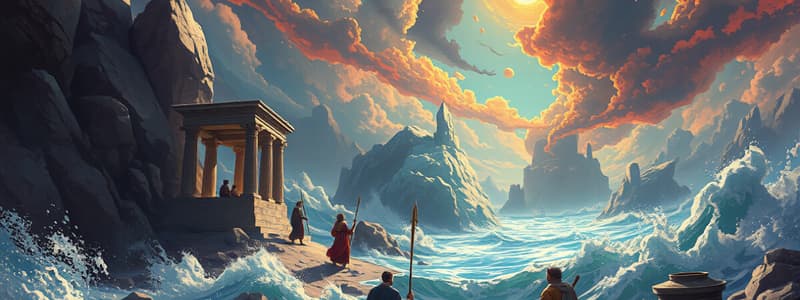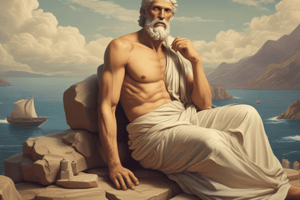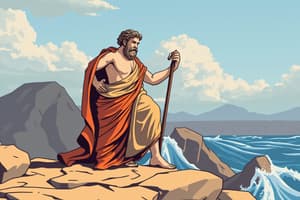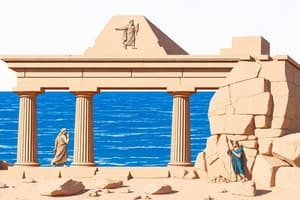Podcast
Questions and Answers
What was the reason Agamemnon was required to sacrifice Iphigenia?
What was the reason Agamemnon was required to sacrifice Iphigenia?
- To gain the favor of Achilles
- To fulfill a prophecy about Troy
- To secure favorable winds for war (correct)
- To save his army from starvation
What caused the conflict between Agamemnon and Achilles?
What caused the conflict between Agamemnon and Achilles?
- Agamemnon's capture of Chryseis (correct)
- Agamemnon's decision to leave the war
- Achilles' demand for command of the army
- Achilles' refusal to return Briseis
What intervention occurred during the duel between Paris and Menelaus?
What intervention occurred during the duel between Paris and Menelaus?
- Zeus stopped the duel from taking place
- Hera promised victory to Menelaus
- Aphrodite saved Paris from defeat (correct)
- Athena protected Menelaus from harm
What motivated Hector's determination to fight after Paris's duel?
What motivated Hector's determination to fight after Paris's duel?
How did Achilles react to the death of Patroclus?
How did Achilles react to the death of Patroclus?
What was a significant factor in Achilles' death?
What was a significant factor in Achilles' death?
What strategy did Odysseus use to infiltrate Troy?
What strategy did Odysseus use to infiltrate Troy?
How did the Trojans respond to the wooden horse?
How did the Trojans respond to the wooden horse?
What ultimately happened to Priam during the fall of Troy?
What ultimately happened to Priam during the fall of Troy?
What fate did Andromache suffer after the fall of Troy?
What fate did Andromache suffer after the fall of Troy?
What was the primary reason for the start of the Trojan War?
What was the primary reason for the start of the Trojan War?
What unique characteristic made Achilles notable in battle?
What unique characteristic made Achilles notable in battle?
Who was the ruler of Troy during the time of the Trojan War?
Who was the ruler of Troy during the time of the Trojan War?
What curse did Cassandra receive from Apollo?
What curse did Cassandra receive from Apollo?
How did Odysseus help recruit Achilles for the Trojan War?
How did Odysseus help recruit Achilles for the Trojan War?
What was the prophecy concerning Paris?
What was the prophecy concerning Paris?
What pledge did Odysseus make to Helen's suitors?
What pledge did Odysseus make to Helen's suitors?
What significant choice did Achilles face regarding his life?
What significant choice did Achilles face regarding his life?
Flashcards are hidden until you start studying
Study Notes
Homer and His Works
- Homer, a blind poet, authored The Iliad and The Odyssey, considered two monumental works in Western literature.
- These epic poems narrate the exploits of heroes like Odysseus and Achilles, alongside themes of love and war.
The Kingdom of Troy
- Troy, a powerful kingdom known for its supposedly indestructible walls, was ruled by King Priam and Queen Hecuba, who had 50 sons and daughters.
- Hector, the eldest son and Troy’s greatest warrior, was deeply devoted to his family and homeland.
Characters in Troy
- Cassandra, Hector's sister, was cursed by Apollo to have her prophecies ignored, despite being a gifted seer.
- Paris, the youngest son of Priam, was prophesied to bring destruction to Troy. He was raised by a shepherd after Hecuba could not kill him.
The Abduction of Helen
- Queen Leda of Sparta bore two eggs after Zeus transformed into a swan. From these eggs hatched Helen, the most beautiful woman in the world.
- To prevent bloodshed over her hand in marriage, Odysseus made all suitors vow to protect her chosen husband, leading to Helen choosing Menelaus.
Oaths and War
- Menelaus' abduction by Paris triggered the Trojan War, as his suitors were bound by oath to defend him.
- Agamemnon of Mycenae led the Greek forces, gathering the greatest warriors including Odysseus, Diomedes, and Achilles.
Achilles' Early Life
- Achilles, raised by the centaur Chiron, was invulnerable except for his heel, where his mother dipped him in the river Styx.
- He faced a prophecy predicting a choice between a long, uneventful life or a short, heroic one. He chose to pursue glory, which would lead him to Troy.
Recruitment for War
- Agamemnon initially struggled to recruit Achilles, who evaded war by disguising himself as a woman on Skyros.
- Odysseus revealed Achilles' identity, leading to his involvement in the Trojan War.
Sacrifice and the Voyage
- Agamemnon angered the goddess Artemis, requiring him to sacrifice his daughter Iphigenia to appease her and secure favorable winds for war.
The Greek Coalition
- Achilles and his allies faced the Trojans, including Aeneas and Hector, demanding loyalty from their allies like the Lycians and Amazons.
- Key Greek leaders, along with Achilles, aimed to besiege Troy but faced setbacks due to a lack of resources.
Conflict and Betrayal
- The Greeks raided cities and took women like Briseis and Chryseis as slaves, leading to tensions between Agamemnon and Achilles.
- After refusing to return Chryseis, Agamemnon wrongfully seized Briseis, sparking Achilles's refusal to fight.
The Duel Between Paris and Menelaus
- Paris and Menelaus agreed to duel for Helen, but Aphrodite intervened to save Paris from defeat, fuelling further animosity.
- Hector felt shame over Paris's defeat, leading to his determination to fight for Troy.
The Death of Patroclus
- Achilles, still in mourning and refusing to fight, faced further loss when his friend Patroclus donned his armor and was killed by Hector.
- This spurred Achilles to seek revenge against Hector.
Achilles vs. Hector
- Achilles killed Hector in a rage, disrespecting his body by dragging it behind his chariot, reflecting the cycle of violence and loss in the war.
- King Priam’s plea for Hector's body showcased themes of grief and humanity amid the brutality of war.
Conclusion of The Iliad
- Hector's death marked a somber end to The Iliad, while setting the stage for subsequent tragedies in the story of Troy.### Achilles' Fall
- Achilles, a key Greek warrior, is fatally wounded by a poisoned arrow shot by Paris, guided by Apollo.
- The injury occurs in his heel, the only vulnerable part of his body, leading to his death.
- As Achilles dies, the Greeks mourn his loss, realizing they have lost their greatest hero.
The Greeks' Desperation and Odysseus' Plan
- Without Achilles, the Greeks face hopelessness regarding penetrating Troy's impenetrable walls.
- Odysseus devises a brilliant strategy using a giant wooden horse to trick the Trojans.
- The horse is hollowed out to hide Greek warriors, allowing them to infiltrate Troy.
The Trojan Response
- The Trojans, seeing the Greek fleet leave and believing the wooden horse to be a peace offering, bring it inside their city.
- Cassandra, gifted with foresight, warns the Trojans of the trap but is ignored and ridiculed.
The Fall of Troy
- At night, Odysseus' warriors emerge from the wooden horse, kill the guards, and open Troy's gates.
- The Greek forces flood into Troy, leading to chaos and destruction, with civilians slaughtered and homes looted.
- Priam, the king of Troy, meets a tragic end at the hands of Pyrrhus, son of Achilles.
Aftermath for the Trojans
- Pyrrhus kills Priam and captures his wife Andromache, enslaving her after throwing her infant son, Astyanax, to his death.
- Cassandra seeks refuge in Athena’s temple but is assaulted by Ajax the Lesser, incurring Athena's wrath that leads to Ajax's demise.
Clytemnestra’s Revenge
- Cassandra is taken as a concubine by Agamemnon, causing jealousy in his wife, Clytemnestra.
- Clytemnestra brutally murders Cassandra, filled with rage over Agamemnon's betrayal.
- She also avenges her daughter Iphigenia by killing Agamemnon in his sleep.
Escape and New Beginnings
- Aeneas, a notable Trojan, escapes the destruction of Troy and eventually settles in Italy, becoming the progenitor of Romulus and Remus.
- Menelaus returns to Sparta with Helen, restoring their rule as king and queen of Spartan land, ultimately leading to a peaceful existence.
Odysseus’ Odyssey
- Odysseus embarks on a long and perilous journey home, facing numerous mythical challenges over ten years.
- His adventures set the stage for the epic tale known as "The Odyssey."
Homer and His Works
- Homer, a blind poet, is renowned for composing The Iliad and The Odyssey, foundational texts of Western literature.
- The Iliad focuses on themes of heroism and the consequences of war, while The Odyssey explores adventure and homecoming.
The Kingdom of Troy
- Troy was an illustrious kingdom with formidable walls, ruled by King Priam and Queen Hecuba, who had numerous offspring.
- Hector, the most valiant Trojan warrior and Priam's eldest son, exemplified loyalty and devotion to Troy.
Characters in Troy
- Cassandra, Hector’s sibling, was gifted with prophetic powers by Apollo but cursed to be disbelieved.
- Paris, prophesied to cause Troy's destruction, was rescued by a shepherd after Hecuba chose not to kill him.
The Abduction of Helen
- Queen Leda of Sparta bore Helen and her siblings from eggs after Zeus, as a swan, seduced her.
- To avoid conflict over Helen's marriage, Odysseus secured pledges from her suitors to protect her choice, which resulted in her marrying Menelaus.
Oaths and War
- Paris’s abduction of Menelaus's wife, Helen, initiated the Trojan War, with Menelaus's allies bound by oath to avenge the act.
- Agamemnon, leading the Greek coalition, assembled renowned warriors including Achilles and Odysseus.
Achilles' Early Life
- Achilles was raised by the centaur Chiron and became invulnerable, save for his heel, where his mother dipped him in the river Styx.
- He was faced with a choice between a mundane life or a brief but glorious existence and opted for the latter.
Recruitment for War
- Initially reluctant, Achilles disguised himself as a woman to avoid participating in the war until Odysseus revealed his true identity.
Sacrifice and the Voyage
- Agamemnon was compelled to sacrifice his daughter Iphigenia to appease Artemis, ensuring favorable winds for the Greek fleet.
The Greek Coalition
- Achilles and his companions confronted Trojan forces led by Aeneas and Hector, striving for solidarity among their allies like the Lycians.
Conflict and Betrayal
- Tensions rose when Agamemnon captured Briseis after refusing to return Chryseis, prompting Achilles to withdraw from battle.
The Duel Between Paris and Menelaus
- A duel was arranged between Paris and Menelaus for Helen, but Paris was saved by Aphrodite, causing resentment among the Greeks.
- Hector's shame over Paris's cowardice pushed him to fight valiantly for Troy.
The Death of Patroclus
- Patroclus, wearing Achilles' armor, was killed by Hector, kindling Achilles's fury and desire for vengeance.
Achilles vs. Hector
- In a fit of rage, Achilles killed Hector and disrespected his body by dragging it, illustrating the harsh realities of war.
- King Priam's request for Hector’s body highlighted profound themes of grief and humanity amidst conflict.
Conclusion of The Iliad
- The poem concludes with Hector's death, setting the stage for further tragedies within the tale of Troy.
Achilles' Fall
- Achilles was fatally struck by a poisoned arrow shot by Paris, facilitated by Apollo, marking a pivotal moment in the Trojan War.
- His death occurred in the heel, his sole vulnerable spot, leading to the Greeks' mourning as they lost their greatest champion.
The Greeks' Desperation and Odysseus' Plan
- Without Achilles, the Greeks faced dire challenges in breaching Troy's strong defenses.
- Odysseus devised a cunning plan involving a giant wooden horse to deceive the Trojans, hiding warriors inside to infiltrate the city.
The Trojan Response
- The Trojans believed the returned Greek fleet abandoned the siege and viewed the wooden horse as an offering of peace, bringing it into their city.
- Cassandra warned of the impending trap but was dismissed and ridiculed due to her cursed foresight.
The Fall of Troy
- Under darkness, Greek warriors emerged from the wooden horse, killed the guards, and opened the gates to the invading forces.
- The assault on Troy resulted in chaos and destruction, with civilians massacred and significant devastation, including King Priam's tragic death at the hands of Pyrrhus.
Aftermath for the Trojans
- Pyrrhus executed Priam and took his wife Andromache as a captive after killing their infant son, Astyanax, reinforcing the War's tragedy and consequences.
- Cassandra, seeking sanctuary in Athena's temple, faced further violation, incurring Athena's vengeance.
Studying That Suits You
Use AI to generate personalized quizzes and flashcards to suit your learning preferences.




